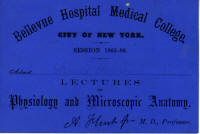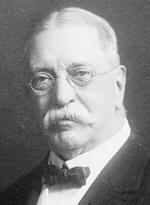Austin Flint,
Jr., M.D.

Click image to enlarge
Go to lecture card display
American physiologist, 1836-1915
Name: Austin Flint, Jr.
Cause of death: cerebral hemorrhage
Death date: Aug 22, 1915
Place of death: New York, NY
Birth date: 1836
Place of birth: Northampton, MA
Type of practice: Allopath
Practice specialities: GS General Surgery
States and years of licenses: NY, 1890
Places and dates of practices: New York, NY, 1857, Buffalo, NY, 1857
Hospital affiliations: General Hospital, New York, Insane Pavilion
of Bellevue Hospital Dispensary, 1896
Medical school(s): Jefferson Medical College of Thomas Jefferson
University, Philadelphia, 1857, (G)
Other education: Private schools, Buffalo, NY, Harvard Univ., 1854,
Med. Dept., Louisville, 1855
Professorship: New York Medical College, Flower & Fifth Avenues
Hospitals New York: Homeopathic Med. Coll of NY, 1859, Physiology,
NY-10 Bellevue Hospital Medical College, New York, Physiology, NY-20
Cornell University Medical College, New York, 1898 |

Austin Flint, Jr. was the
son of the physician Austin Flint (1812-1886). He was a physiologist and
educator who founded the Bellevue Hospital Medical College, where he was
professor and chair of the Department of Physiology and Microbiology
from 1861 to 1897. He was also the surgeon general for the state of New
York.
Austin Flint, Jr., physician, born in
Northampton, Massachusetts, 28 March 1836, accompanied his parents to
Buffalo, where he received his early education. He entered Harvard in
1852, but left at the end of his first year, and spent some time in the
study of civil engineering. In 1854 he began his medical studies in
Buffalo, continued them in Louisville, and was graduated at the
Jefferson medical College, in Philadelphia, in 1857. Subsequently, until
1860, he edited the " Buffalo Medical Journal," which afterward was
transferred to New York and merged in the " American Medical Monthly."
In 1858 he was appointed one of the attending surgeons of the Buffalo
City hospital, and during the same year was appointed professor of
physiology in the Buffalo medical College. He came to New York in 1859,
was elected to the chair of physiology in the New York medical College,
and to a similar chair in the New Orleans school of medicine in 1860,
but resigned the latter at the beginning of the civil war.
As a student in Louisville, he had
developed a special taste for physiology, mid had experimented on living
animals with Professor Lunsford P. Yandell. While in New Orleans he
experimented on alligators, and developed some important points with
reference to the influence of the pneumogastrie nerves upon the heart.
Dr. Flint was the first physiolgist in the United States to operate on
the spinal cord and the spinal nerves in living animals, arm early in
1861 spent several months studying in Paris under Charles Robin and
Claude Bernard.
On the organization of the Bellevue hospital medical
College, in 1861, he became professor of physiology and microscopic
anatomy, and also secretary and treasurer of the faculty. For eight
years he delivered lectures on physiology in the Long Island College
hospital.
In 1874 he became surgeon general of New York state, His
experimental work has received high praise. In 1862 his investigations
on "A New Excretory Function of the Liver" was presented to the French
academy of sciences for the Monthyon prize, and in 1869 it received
honorable mention and 1,500 francs. He published in 1869 an elaborate
review of the history of the discovery of the motor and sensory
properties of the roots of the spinal nerves, in which the discovery was
ascribed to Francois Magendie instead of to Sir Charles Bell, who has
generally been regarded as its author. During the same year he conducted
a series of experiments upon the glyeogenic function of the liver, in
which he endeavored to harmonize various conflicting observations, and
is considered to have settled the question. Dr. Flint is a member of
medical and scientific societies, has been a large contributor to
medical journals, and has published numerous monographs, he was the
author of articles in the "American Cyclopaedia," and his works include
"The Physiology of Man" (New York, 1866'74);" Manual of Chemical
Examination of the Urine in Disease" (1870; 6th ed., 1884); "Textbook of
Human Physiology" (1876: 3d ed., 1881); "' On the Source of Muscular
Power" (1878); and "On the Physiological Effects of Severe and
Protracted Muscular Exercise" (1871).
________________
From Bellevue Hospital:
1869
Flint, Austin, Jr.,
1874.
M. D., Jefferson, 1857; LL. D.,
1885; Surg., Buffalo Gen. Hosp., 1858; U. S. (Ladies' Home) Gen.
Hosp., N. Y. City, 1862-66; Surg.-Gen., State N. Y., 1874-78; Prof.
Physiol., Univ. of Buffalo, 1858-59; N. Y. Med. Coll., 1859-60; New
Orleans School Med., 1860-61; Bell. Hosp. Med. Coll. since 1861 ; L.
I. Coll. Hosp., 1869-74. Editor "Buffalo Med. Jour.," 1857-60.
Author of "Physiol. of Man," 5 vols., 8°, pp. 500 (Appleton,
1866-74; 2d ed., 1875); " Chemical Examination of Urine in Disease,"
pp. 76, N. Y., 1870 (6th ed., 1884); "Physiological Effects of
Severe & Protracted Muscular Exercise," pp. 91, N. Y., 1871
(idem, with supplementary remarks, London, 1876); "Text- Book of
Human Physiology, pp.978, 8°,N.Y., 1875 (4th ed., 1888) ; " Source
of Muscular Power," pp. 103, N. Y., 1878; and articles: " Phenomena
of the Capillary Circulation," inaug. thesis, Phila., 1857;
"Experiments on the Recurrent Sensibility of the Anterior Roots of
the Spinal Nerves," New Orleans, 1861 ; " New Function of the
Liver," Phila., 1862; "The Organic Nitrogenized Principles of the
Body, with a New Method for their Estimation in the Blood," Phila.,
1863 ; " Reports on Diet for the Institutions under the Charge of
the Commissioners of Public Charities and Correction," N. Y., 1867;
" Historical Considerations Concerning the Properties of the Roots
of the Spinal Nerves," N. Y., 1868; " Recherches Experimentales sur
une Nouvelle Fonction du Foie," Paris, 1848; received "Honorable
Mention," with a recompense of 1500 francs, from the
Institute of France (Academic des Sciences) in 1869 (Concours Mon-
tyon Medicine et Chirurgie); " Glycogenic Function of the Liver," N.
Y., 1869; "Prolonged Muscular Exercise and the Elimination of
Nitrogen," N. Y., 1870 (idem, 2d memoir, 1871); " Reflex
Nervous Action in Normal Respiration,"Chicago,1874; "Source of
MuscularPower,"London, 1876;"Excretory Function of the Liver," Phila.,
1877 ; " Memoir of Claude Bernard," Phila., 1878; "Experiments &
Reflections on Animal Heat," Phila., 1879; "Is the Action of the
Medulla Oblongata in Normal Respiration Reflex?" Phila., 1880; "
Cause of the Movements of Ordinary Respiration," London, 1881 ; "
Treatment of Diabetes Mellitus," Chicago, 1884; "Relations of
Physiology to the Practice of Medicine," N. Y., 1886; "Mechanism of
the Singing Voice," N. Y., 1888; American Medical Students," Phila.,
1888; " A Possible Revolution in Medicine,"N.Y., 1888; "Fever"
(Address in behalf of the U. S. deliv. in Gen. Sess. 9th Intern.
Med. Cong., Wash., 1887); "Late Theories Concerning Fever," N. Y.,
1889; "The Open Door of Quackery," N. Y., 1889; "The Revolution in
Medicine," N. Y., 1890,
etc. Son of Austin Flint (1861-86), and father of Austin Flint, Jr.
(1890, II).
|